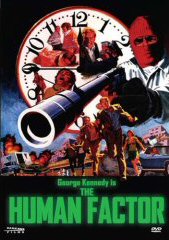
Influenced thematically by the shifting cultural morality of the mid-seventies, and indebted visually to the atmospheric nihilism of 1940's Noir, the revenge thriller in both Italy and the United States grew more sophisticated -- and more violent -- after the Old Testament sentiment of such grimy spectacles as Death Wish replaced the conservative symbolism of over-simplistic Good and Bad with the disruptive ambiguity of 'regular' men taking the law into their own calloused hands. While several of these simplistic yet primal (and therefore effective) thrillers have been celebrated and critically dissected over the years, one of the more unique of the bunch -- The Human Factor -- has been ignored. Dark Sky rectifies this oversight with a surprisingly clean copy of George Kennedy's obscure but emotionally poignant rampage.
Directed by Edward Dmytryk, The Human Factor features cinematic great Kennedy as John, a NATO computer programmer working/living in Napes, Italy with his family, balancing the stress of a high tech job and that of a caring if occasionally preoccupied father. The placidity of this lifestyle is cruelly shattered the night he comes home to discover his wife and three young children murdered. Employing his technological savvy, he gleans information leading to the identity of the murderers. Aided by side-kick Mike McAllister (John Mills), Kindale discovers (while working outside the lumbering police investigation) that the killers belong to a terrorist organization determined to slay American families (sure to resonate with many Americans in today's political climate, yes?) calling Europe their home. Keeping free of the police, Kindale embarks upon a spree of revenge, slave to his desire for vengeance.
Owing much to the seedy atmosphere of the Noir films which stabbed a hole in the illusive carpet of morality decades before, and mirroring the thematic underpinnings of the Poliziotteschi sub-genre, The Human Factor is a flawed if entertaining entry in the revenge sweepstakes. Circling around corrupt politics, international conspiracies, and the price of violent justice, this film is more concerned with destroying our faith in social law than paving the streets with blood. While violence is in no small supply, emotional and spiritual crises take precedence over what could have been simple viciousness, with Kennedy's performance lending authority and emotional depth to a plot that is riddled with strained coincidences. While the technology used to propel the plot is rather outdated when viewed from today's vantage point, and Kennedy depends on this trope too much for the story's own good, a basic streak of humanity elevates the script. Good and evil are shown as rather useless terms, determined by subjectivity and event. Amorality is infused with tragedy and power abuse, and heroes can't operate without resorting to crime.
The Human Factor has never looked better, receiving respectful treatment by Dark Sky, who presents the film in its1.85:1 aspect ratio (with additional anamorphic enhancement for 16x9 televisions). Visual clarity is quite impressive, albeit some grain betrays the film's age. Colors are clear and vivid, and the English (in Mono) is serviceable. Extras are bare but engaging, including "The Kennedy Factor: An Interview with George Kennedy," which, running at around 25 minutes, is honest and invigorating. Kennedy, while 81, is as young as he feels, and his enjoyable discussion covers everything from his awards to the film at hand. His memories of the story behind the story is fascinating and downright funny at times, and well worth the time invested. Other extras include a still gallery and TV spot.
Review by William P. Simmons
| Released by Dark Sky Films |
| Region 1 - NTSC |
| Not Rated |
| Extras : |
| see main review |